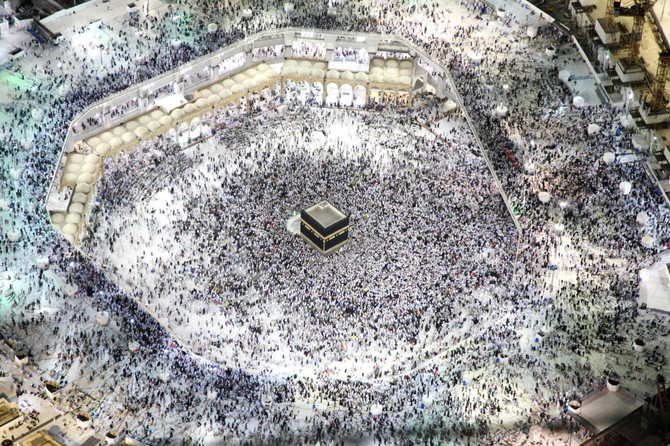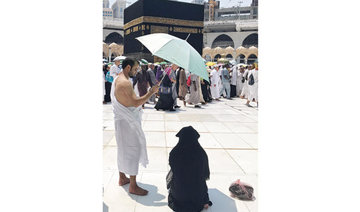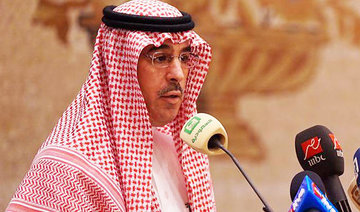JEDDAH: The Ministry of Hajj and Umrah has referred a group of Tawafa service providers, including some Hajj offices serving Algerian pilgrims, to the ministry’s disciplinary council pending trial and application of penalties against them.
The ministry stressed it will apply strict penalties on Tawafa establishments proved to have breached service contracts signed between them and pilgrims. Penalties will range between fines and revoking permission to practice the profession.
The disciplinary council, which comprises representatives of the Ministry of Interior and the Public Prosecution, is assigned to look into Tawafa establishments in breach of regulations stipulated in the Tawafa system, and other decisions and regulations ordered by the Ministry of Hajj and Umrah.
This will be the first case where Tawafa service providers have been referred to the appropriate authorities in the Kingdom. Three years ago, the then-Bureau of Investigation and General Prosecution (BIGP), currently the Public Prosecution, referred one employee of the National Establishment of Tawafa for South Asian Pilgrims in Makkah Region to court for insulting and questioning the integrity of the ministry’s staff.
Meanwhile, Minister of Hajj and Umrah Mohammed Salih Bentin on Wednesday honored a number of the ministry staff for their efforts and accomplishments, as well as their effective contributions to the success of the current Hajj season. The ceremony came on the sidelines of the annual party for the heads and members of Hajj affairs offices, and guests of the Hajj mega-symposium of the current Hajj season.
Those honored included the adviser and general supervisor to the Hajj mega-symposium, Hatim Qadi; the head of the organizing committee of the symposium Hisham Al-Abbas; head of the scientific committee, Yusuf Al-Faqi; the head of logistics committee, Bandar Al-Sulaimani; head of the media committee Ali Al-Ghamdi; the head of the reception committee, Husam Najm; and the head of the administrative and financial committee, Said Al-Harbi.
In another development, the director general of Saudi Arabian Airlines (Saudia) Salih Al-Jasir on Wednesday inspected the Hajj and Umrah terminal at King Abdul Aziz International Airport in Jeddah and was briefed on the operational process and Hajj departure flights in their second day. He also met with members of work teams assigned to serve pilgrims and, in this context, expressed his appreciation for their efforts in this regard.
The Saudia chief also lauded the cooperation between Saudia and Hajj grouping agencies and urged them to enhance on the success witnessed by the operational plans of Saudia in the arrival stage of pilgrims which grew by 40 percent compared to pilgrims transported last year.
He said serving pilgrims comes atop priorities of the national carrier (Saudia) and, thus, plays that role as do other government agencies concerned with serving pilgrims. He said they were proud to undertake that responsibility to the fullest.
Measures and arrangements were taken to facilitate the departure of pilgrims and achieve the highest rates of smooth movement, he pointed out.
Hajj agents face penalties from Saudi disciplinary council for breaching contracts with pilgrims
Hajj agents face penalties from Saudi disciplinary council for breaching contracts with pilgrims

Masam Project clears more than 4,600 explosive devices from Yemen conflict in Abyan

- Operation took place on Thursday in Wadi Dufs area of Zinjibar, east of Yemen’s de facto capital Aden
- Clearance took place in high temperatures, rugged terrain of Abyan Governorate
RIYADH: Saudi Arabia’s Project for Landmine Clearance, known as Masam and launched by Saudi aid agency KSrelief, has successfully destroyed more than 4,600 explosive devices left behind from the war in Yemen.
The operation took place on Thursday in the Wadi Dufs area of Zinjibar, in Abyan Governorate, east of Yemen’s de facto capital Aden.
The project reported the destruction of 4,620 pieces of ammunition and remnants of war, including 155 projectiles, 235 combat fuses, 85 pieces of armor-piercing ammunition, 4,096 bullets, 13 anti-personnel mines, five anti-tank mines, and 31 grenades.
The Masam Project added that its efforts aimed to enhance community security and protect the lives of civilians in Yemen.
Engineer Munther Qassem, commander of the first special task force at Masam, said that the operation had been conducted in a safe area, away from residential communities and agricultural regions, ensuring full compliance with international standards.
He added: “The work of the special task teams does not stop throughout the year, given the importance of our missions in protecting the lives of innocent citizens.”
Qassem added that the team had successfully carried out the operation despite the high temperatures and rugged terrain of Abyan.
The Masam Project stands as a vital contribution to enabling a safe and dignified life for Yemenis.
KSrelief has implemented 3,438 diverse humanitarian projects across 107 countries, valued at over $7 billion, since its launch in May 2015.
Venezuelan president sends message to King Salman, affirming ties

- The Venezuelan ambassador to Riyadh, David Velasquez Caraballo, handed the letter to the Saudi Ministry of Foreign Affairs
RIYADH: President of Venezuela Nicolas Maduro has written to King Salman regarding the relationship between Riyadh and Caracas and ways in which it could be strengthened.
The written communication was handed to Dr. Abdulrahman bin Ibrahim Al-Rassi, undersecretary for multilateral international affairs at the Saudi Ministry of Foreign Affairs, by David Velasquez Caraballo, the Venezuelan ambassador to Riyadh, on Thursday. Al-Rassi is also supervisor general of the Public Diplomacy Agency at the Foreign Ministry.
During their meeting, he and Caraballo discussed ways of enhancing bilateral relations between Saudi Arabia and Venezuela, as well as other topics of mutual interest.
KAUST develops new cooling technology to improve efficiency and lifespan of solar panels

- New technology has the potential to cut down the maintenance cost of solar cells
- Experiments were conducted in cold and rainy regions of the US to test effectiveness in different climate conditions
RIYADH: The King Abdullah University of Science and Technology has made a notable research breakthrough, developing a new composite material that improves the efficiency and lifespans of the cells used in solar panels through cooling.
The new technology has the potential to cut down the maintenance cost of solar cells, according to the Saudi Press Agency. Results of the study, carried out in partnership with the King Abdulaziz City for Science and Technology, were published in the journal Materials Science and Engineering.
The study targeted the issues of commercial solar panels, which only convert around 20 percent of sunlight into electricity, while the remainder is absorbed as heat or reflected away. Other problems include high temperatures, which reduce the efficiency and performance of the cells, shortening their lifespan and demanding more frequent replacement.
This means that cooling is essential, yet traditional cooling systems such as fans and pumps consume electrical energy; passive cooling, on the other hand, requires no electricity.
Prof. Chiaochiang Gan, lead researcher at KAUST, explained that the nanomaterials used in the passive cooling process are thin substances that can be applied to multiple systems that demand cooling, such as solar cells and agricultural greenhouses, without affecting their performance.
He said that the study, conducted through the Center of Excellence for Renewable Energy and Storage Technologies, led to the creation of a material that absorbs moisture from the air at night and releases it during the day.
Covering solar cells with this material, when deployed in coastal areas of Saudi Arabia for weeks, helps keep them cool.
The passive cooling technology also helps reduce the cost of generating electricity from these cells by 18 percent.
Experiments were also conducted in cold and rainy regions of the US to test its effectiveness in different climate conditions; the results proved the technology effective in all environments.
Preliminary studies also show that other applications for the material include light-emitting devices, which typically suffer from reduced efficiency at higher temperatures.
Abdullah Al-Muqbil, researcher at the Institute of Microelectronics and Semiconductors, director of the Optics and Electronics Center of Excellence at KACST, and co-author of the study, noted that these findings also open up potential for application in lighting and laser technologies.
The research team at KAUST achieved a record-breaking performance in solar cell efficiency due to their specialized designs, showcasing the diverse expertise at the university, according to SPA.
The Center of Excellence for Renewable Energy and Storage Technologies is one of four research centers of excellence run by KAUST. It aims to support the Kingdom’s national goals in fields such as artificial intelligence, food security, renewable energy and storage technologies and smart health.
Replacement of Holy Kaaba’s kiswa completed

- Kiswa exceeds 14 meters in height and is adorned with Quranic verses embroidered with gold-coated silver and pure silver threads, written in the Thuluth script
RIYADH: The Grand Mosque in Makkah faced the dawn of the first day of the first month in the Islamic calendar, Muharram, with the kiswa-changing ceremony by the General Authority for the Care of the Two Holy Mosques, represented by the King Abdulaziz Complex for the Holy Kaaba Kiswa.
This annual event embodies the Kingdom’s commitment to serve the Two Holy Mosques — not only in organizational and administrative aspects but also on a symbolic and sacred level, given the central place the Kaaba holds in the hearts of more than a billion and a half Muslims worldwide.
They installed the embroidered curtain with gold-plated threads, the hizam (belt), the samadiah (decorative elements), lantern-shaped pieces, and decorations surrounding the mizab (rainwater spout), the corners, and other adornments, creating a captivating scene infused with feelings of reverence and supplication.
The occasion also highlights the pioneering role of Saudi youth, who form the backbone of production, supervision, and execution within the complex.
National competencies demonstrate leadership in guiding work teams, overseeing design details, and innovative technical solutions that ensure the highest standards of precision — merging exquisite craftsmanship with modern technological aspirations.
The kiswa exceeds 14 meters in height and is adorned with Quranic verses embroidered with gold-coated silver and pure silver threads, written in the Thuluth script, forming a masterpiece that demands precise engineering, care and artistic expertise to preserve its identity and quality over time.
This annual event is not merely a repeated occasion but an extension of a historical legacy established by the Founding King Abdulaziz — and reinforced by King Salman and Crown Prince Mohammed bin Salman. It is part of the national vision centered on serving the Two Holy Mosques and enhancing the quality of services provided to pilgrims and other visitors.
Every year, the ceremony to change the kiswa is a memorable scene in the collective memory of the Islamic nations and a living symbol of how the care for the holy sanctuaries has evolved from a responsibility into a leadership role.
Saudi Arabia marks world’s anti-drug day

- More than 922 kg of banned substances seized in KSA over 12 months
- A number of awareness events were held across the country on Thursday — the UN’s International Day against Drug Abuse and Illicit Trafficking
RIYADH: More than 922 kg of banned substances, including more than 20 million pills, have been seized in Saudi Arabia over the past year, the Kingdom’s customs authority announced on Thursday as officials marked the UN’s world anti-drug day.
One recent drug bust in cooperation with authorities from the Syrian Arab Republic thwarted an attempt to smuggle 200,000 amphetamine tablets from the Levant nation, a Ministry of Interior spokesperson said via the Saudi Press Agency.
The announcement was made as a number of awareness events were held across the country on Thursday — the UN’s International Day against Drug Abuse and Illicit Trafficking.
Events in the Riyadh and Asir regions will run until Saturday, educating members of the public about the dangers of drugs.
Smugglers have attempted to bring contraband into the country in various ways, by concealing the items in shipments of food, household utensils, vehicles, shoes and even inside their body cavities, the Zakat, Tax and Customs Authority said.
The organization places the fight against drugs as one of its top priorities and will continue to tighten security at the Kingdom’s borders, it added.
Jasem Mohamed Albudaiwi, the secretary-general of the Gulf Cooperation Council, said that the GCC countries see drug control measures as a top priority.
The GCC states have formed a united front to tackle the use and trade of illicit substances which endanger families and society, he added.
Albudaiwi also stressed the importance of reintegrating recovering drug addicts into society, and highlighted the role that schools, the media, religious leaders and civil society’s institutions play in stopping the use of drugs.
Meanwhile, the Naif College for National Security in Riyadh celebrated the graduation of 63 trainees of various courses on Thursday, including anti-drug programs.
The ceremony was attended by Maj. Gen. Muhammad bin Saeed Al-Qarni, the director general of narcotics control, who congratulated the graduates and stressed that the Kingdom’s anti-drug programs received the full support of the country’s leadership.
The Zakat, Tax and Customs Authority has called on members of the public to contribute to the fight against drug smuggling in order to protect society and the Kingdom’s economy.
Reports can be made to the domestic telephone number 1910, internationally via 009661910, or via email at 1910@zatca.gov.sa.
All reports are treated with confidentiality, the authority said, and accurate information will be rewarded financially.




















